Nigerian Broker Who Made Market Takes Big Fall

Peter Ololo Peter Ololo Faces Huge Debts to Banks, Charges After Once Dominating Trading
EN-GB X-NONE X-NONE
Antigraft authorities have raided a cluttered ninth-floor office in New Africa House in Lagos's financial district twice since August, seeking evidence against an unassuming man who is alleged to have committed serious financial crimes and has become the biggest debtor to Nigerian banks.
The office belongs to Peter Ololo, a once-highflying stockbroker for the country's biggest banks and individuals. A little more than a year ago -- with oil wealth pouring in and the Nigeria Stock Exchange on a tear -- Mr. Ololo dominated stock trading there, according to regulators, bankers and other traders. Fellow brokers say they called him "Market."
Today, Mr. Ololo, 52 years old, is out on bail after being arrested in August and again in October, charged with conspiring to manipulate share prices at Afribank and Union Bank and illegally obtaining loans, and is barred from leaving the country.
Mr. Ololo's case has highlighted the excesses of Nigeria's banking sector and stock market.
In an August court filing by the country's top antigraft unit, the Economic and Financial Crimes Commission , Mr. Ololo is listed in two cases as allegedly conspiring with two bank executives, Sebastian Adigwe of Afribank and Bartholomew Ebong of Union Bank, "by fraudulent means to manipulate the market price" of the two banks' shares. Authorities allege that if a bank needed to boost its stock price, bankers such as Messrs. Adigwe and Ebong would call Mr. Ololo and tell him to buy or sell shares. Other traders would follow his lead.
In addition to the share-manipulation charges, Messrs. Adigwe and Ebong are charged with making improper loans to Mr. Ololo and some institutions.
Mr. Ololo's lawyer, Femi Falana, said his client declined to comment, but said Mr. Ololo acted legally at all times and has documents showing his transactions with banks were proper. Lawyers for the two bankers couldn't be reached. Officials at Afribank and Union Bank declined to comment.
All three men have pleaded not guilty. Their trial will resume at a Lagos federal court on Thursday , an EFCC spokesman says.
"There's a bit of ignorance on the part of those who are accusing him," Mr. Falana said. "He was simply managing the stocks. When the shares were going up, everyone was happy. Now that the shares are falling, he can't be blamed for that." The EFCC has arrested more than 20 bank executives, in addition to Mr. Ololo.
The Central Bank of Nigeria , meanwhile, says that as director and main shareholder in Falcon Securities Ltd. and Resolution Trust Investment Co., Mr. Ololo is the single-biggest debtor to a group of nine Nigerian banks the country bailed out this year, owing five of them $708 million. Falcon and Resolution are still operating; representatives declined to comment.
The EFCC says Mr. Ololo racked up debt by borrowing from four of the bailed-out banks to plow into stocks, on his own behalf and for clients, including some of the banks. According to Nigerian law, the loans are illegal if granted without adequate security.
Mr. Ololo was a man whose name few in Nigeria had heard. While many top banking and business executives in the country are chauffeured in luxury vehicles, accompanied by armed escorts with sirens blaring. Mr. Ololo drove himself in a nondescript Peugeot 307.
An accountant by trade, Mr. Ololo worked for years at Union Bank. In 1993, he started Falcon Securities. Friends and associates said he started trading modestly, but won a reputation as a market mover.
"His Union Bank relationship gave him a start, and he built up a reputation as the biggest trader. Things spiraled from there," said an investment banker in Lagos. "It's a big country, but a very small market."
Buoyed by record oil prices , Nigeria's biggest banks started lending liberally. Bank executives also started investing heavily in the stock market for themselves and on behalf of clients.
Often, banks used their own in-house brokerages, but they also used independent brokers. Through Falcon and Resolution, Mr. Ololo in the late 1990s started borrowing money from banks to buy stocks for himself and his clients, according to colleagues of Mr. Ololo.
A representative for the Nigerian Stock Exchange declined to comment, saying the matter was in the hands of the EFCC and the courts. "We have to allow the rule of law to take place," the representative said.
Average daily trading at the Nigerian bourse is just $13 million, an exchange spokesman says. That means individual traders can move prices relatively easily.
Some days, Mr. Ololo accounted for as much as 40% of market volume, according to a colleague of Mr. Ololo with access to data at Falcon.
Mr. Ololo's exposure came back to haunt him and his investors when the global economic downturn hit late last year and the market crashed. The exchange's All-Share Index fell 46% in 2008 and has shed 33% this year.
In mid-August, the central bank seized five crippled banks and fired senior management at all of them. Then, the central bank took the extraordinary step of publishing on its Web site a list of the top debtors to the banks. Four more banks were bailed out in October and their executives fired. In all, Nigeria pumped $3.9 billion into the nine banks.
Bank regulators said they have tried to get the $708 million back from Mr. Ololo, searching his homes and offices and seizing his passport in August. Thus far, authorities haven't revealed the results of their search.
By: Will Connors
